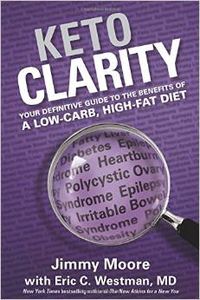Difference between revisions of "Keto Clarity"
From Fellrnr.com, Running tips
User:Fellrnr (User talk:Fellrnr | contribs) (Created page with "{{DISPLAYTITLE:A Review of Keto Clarity}} The cover of Keto Clarity. [http://www.amazon.com/Keto-Clarity-Definitive-Benefits-Low-Car...") |
(No difference)
|
Latest revision as of 09:01, 7 October 2014
Keto Clarity is a popular book on the Ketogenic Diet, but it has a number of serious flaws, and should be read with caution. If you're interested in the Ketogenic Diet, then I'd recommend reading the balanced and objective Ketogenic Diets: Treatments for Epilepsy and Other Disorders, by Eric H. Kossoff. While Kassoff's book is focused on the use of the Ketogenic Diet as a medical treatment, it should be read by anyone considering the diet.
- Overall, I found Keto Clarity to be rather rambling. It has contributions and quotes from many people, and the overall effect is confusing and sometimes contradictory. (Ironically you could say it lacks clarity.)
- The tone of Keto Clarity is one of pushing an idea rather than allowing the reader to make an informed choice.
- Keto Clarity quotes many scientific research papers, but these are just listed by chapter, with no reference in the body of the text, so it's virtually impossible to determine if a statement is based on opinion or science.
- The nearest you get to any mention of the Health Risks of the Ketogenic Diet is the disclaimer at the beginning.
- While the book states that "scurvy from a lack of vitamin C isn't an issue on ketogenic diets", there are well documented cases of scurvy on the Ketogenic diet. Personally, I suspect that sub-clinical vitamin C deficiency is a common issue with the Ketogenic Diet.
- There is insufficient emphasis on the need to additional salt on the Ketogenic Diet. It is mentioned in a few places, but mostly under cramping and feeling hungry.
- Keto Clarity is the only low carbohydrate or ketogenic diet advice I've come across that treats Fiber as a carbohydrate and ignores the concept of Net Carbohydrates. The book glosses over the issue of constipation that is a common and pervasive side effect of the diet. (The book does advise eating more leafy greens. This contradiction seems common in the book.)
- While there is a section on interpreting scientific claims, the section on the Ketogenic Diet as a Treatment seems to be overly optimistic, and again does not present a balanced perspective. For instance, the book claims there is "good evidence" for the Ketogenic Diet helping with schizophrenia, even though the evidence quoted is a single case study and the benefits are likely to be due to avoiding gluten rather than the Ketogenic Diet itself.
